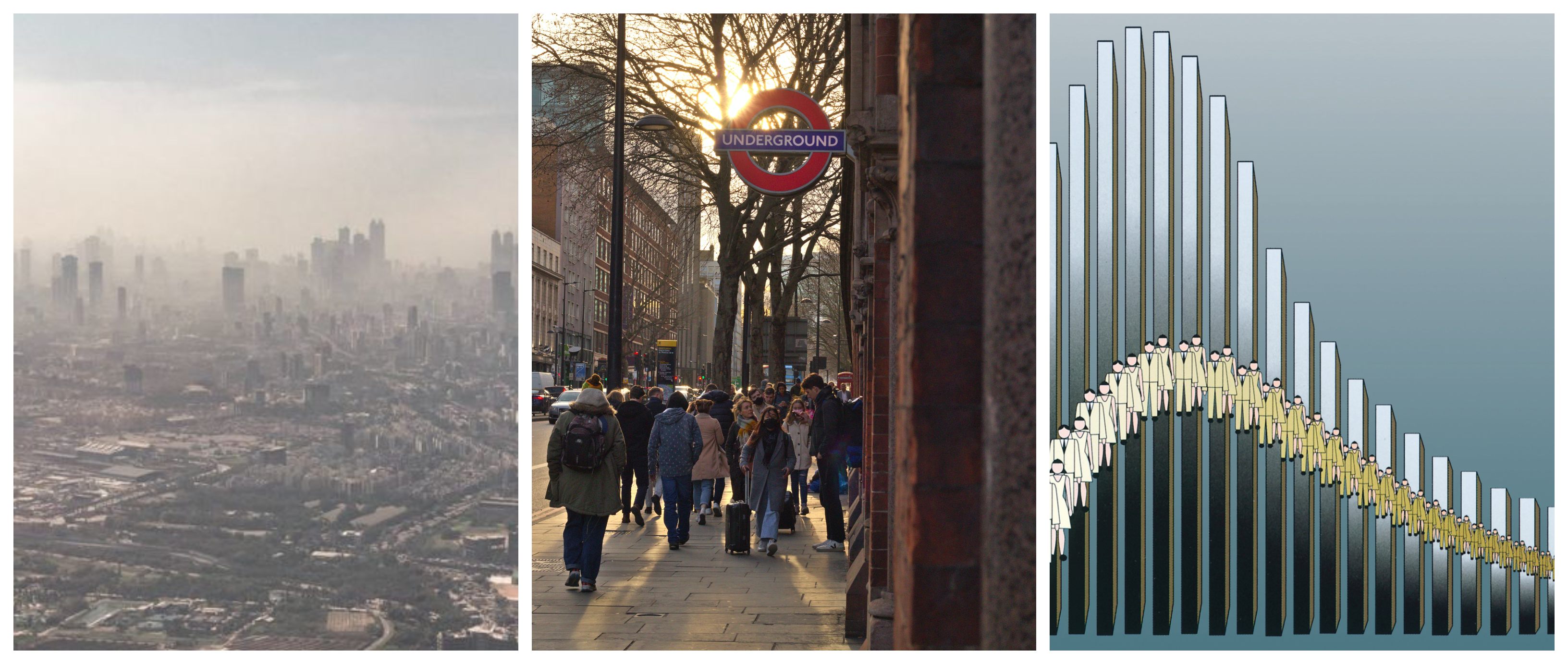Air Pollution Epidemiology
The existing consensus for the adverse health effects of air pollution relies to a large extent on results of epidemiological studies and was built through a difficult debate in the scientific literature and international fora. The Air Pollution Epidemiology Team started relatively recently, in July 2020, but incorporates members who have contributed substantially to the evidence on the associations between air pollution and health, as well as to policy inputs. The team focusses on studying air pollution and health. Since improving health is a motivation of ERG as a whole, our work encompasses contributions from other ERG teams by bringing in their data and expertise. There are several research teams in the UK and London working on environmental aspects of health, but this team focuses on air pollution epidemiology in a rather unique way. This includes a focus on methodological issues that impact interpretation of epidemiological studies and improving approaches to health impact assessment. While many of the team’s projects involve the effects of air pollution, other environmental factors, such as temperature, as well as interactive effects between environmental factors or between environmental and other factors (e.g. infections), are also covered.

Research
Members of the team have extensive experience in implementing large scale epidemiological studies and addressing methodological issues that are important for air pollution research, such as measurement error or the interpretation of epidemiological results for policy. Professor Klea Katsouyanni has led large collaborative internationally funded projects, such as the APHEA and APHENA projects, and participated in several others e.g. ESCAPE, ELAPSE, PHEWE, EUROHEAT, AIRGENE. More recently she was the PI of the concluded STEAM project, funded by the MRC Methodology Panel, and the ongoing MELONS project, funded by the US Health Effects Institute. The team has been involved in multiple health impact assessment projects, led by Dr Heather Walton, funded by various organisations, such as the Greater London Authority, Transport for London, Clean Air Fund, Defra and WHO. Other members of the team are: Dr Dimitris Evangelopoulos who is an MRC Centre for Environment and Health Research Fellow working on the identification of the impact of exposure measurement error on health effect estimation and Dr Dylan Wood, who is a Research Associate in the MELONS project and recently concluded his PhD project on the association of air pollution exposure and cognitive function in adults. The Air Pollution Epidemiology team is also contributing to the NIHR net zero project and the HORIZON2020 EXPANSE project. The group also has a collaboration with the Exposure Science team in analysing the health data from the COPE project in COPD patients and is contributing to the Wellhome ERG project by leading a work-package (WP) and participating in other WPs.
Alongside work on assessing the health effects of air pollution in an epidemiological context, the team will further look to focus on methods development capitalizing on the unique datasets available in London. The team will also focus more on the interactions with other environmental factors, such as climatic variables and noise. Understanding interactions should help in developing methods to deal with combined risks in health impact assessment. The team will continue to work closely with expert committees such as the Committee on the Medical Effects of Air Pollutants (COMEAP).
Education
The team currently delivers the Health Impact Assessment and Environmental Epidemiology module which are available for students pursuing the Master of Public Health and MSc Epidemiology. The team is also actively involved in teaching of iSTEMM modules under the themes Big data and biostatistics, Epidemiology, and Policy analysis, which are offered to all Imperial undergraduate students.
We also supervise summer projects for students on the Masters in Public Health and the MSc in Epidemiology. For example:
Find out more about our projects
The air quality health and economic costs and benefits of a zero carbon UK
UKRI SPF Clean Air Programme – Clean Air Champion
Improving diagnostics and therapeutics in never-smoker lung cancer patients
IONA- Assessing the impact of non-tailpipe emissions from traffic on the asthmatic airway
Pathway to WHO: Achieving clean air in the UK - Modelling air quality costs and benefits
Investigating links between air pollution, COVID-19 and lower respiratory infectious diseases
Most of our research projects are published in journal articles. Contract work is often published as reports. Links to past projects are given below.
Understanding the health impacts of air pollution in London
Department of Health Policy Research Programme Project: Systematic review and quantitative meta-analysis of the evidence for associations between chronic and short-term exposure to outdoor air pollutants and health(peer reviewed report)
Accordion
Team members
Klea Katsouyanni
/dev01/channel_2/media/migration/faculty-of-medicine/klea-katsouyanni_1639647818170_x4.jpg)
Klea Katsouyanni
Professor of Public Health
Dr Dimitris Evangelopolos
/dev01/channel_2/media/migration/faculty-of-medicine/dimistris_1622479203065_x4.jpg)
Dr Dimitris Evangelopolos
Research Fellow
Gary Fuller
/dev01/channel_2/media/images/people-list/Gary-Fuller.jpg)
Gary Fuller
Senior Lecturer
Shawn Lee
/dev01/channel_2/media/migration/faculty-of-medicine/shawn-lee_1643801655356_x4.jpg)
Shawn Lee
Research Assistant
Aksayaa Perinpakumar
/dev01/channel_2/media/images/people-list/Aksayaa-Perinpakumar---2.jpg)
Aksayaa Perinpakumar
Research Postgraduate
Rina So
/dev01/channel_2/media/imperial-college/data-science-institute/blank-profile-picture-973460_960_720.jpg)
Rina So
Visiting Researcher
Heather Walton
/dev01/channel_2/media/migration/faculty-of-medicine/heather-walton_1627238407453_x4.jpg)
Heather Walton
Senior Lecturer in Environmental Health
Dylan Wood
/dev01/channel_2/media/migration/faculty-of-medicine/dylan-wood_1643801945412_x4.jpg)
Dylan Wood
Research Associate
Charlotte O’ Herne
/dev01/channel_2/media/images/people-list/Charlotte-O'Herne---2.png)
Charlotte O’ Herne
PhD Student
Emma Quartermain
/dev01/channel_2/media/images/people-list/Emma-Quartermain--2.png)
Emma Quartermain
PhD Student
Margarita White
/dev01/channel_2/media/images/people-list/Margarita-White---2.png)
Margarita White
Research Postgraduate


